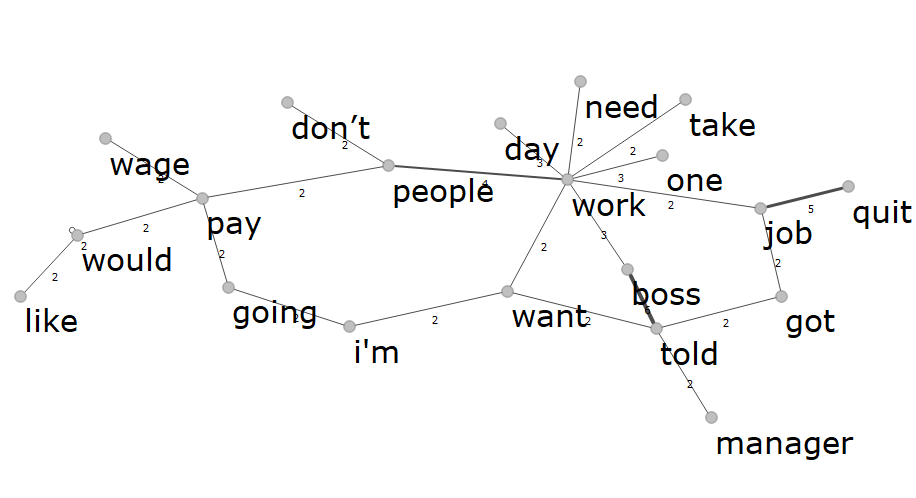Quick and Dirty: Antiwork SNA
this isn't real research. or is it? kinda middling, imo.
I mean, let’s take a meme from McLuhan’s book and call this a probe.
I’m trying something new, because apparently that’s what people should do.
When I’m wearing my scholar hat (it’s not really a hat, it’s a worn-out gaming headset) I’m looking at ways to explore the internet differently. Sure, anyone can write a thinkpiece or do a little qualitative interview to explore some of the memes with research-object themes, but are you so sure of your assertions?
Like, they make absolute sense to you and the reality that you inhabit…but the realities we inhabit, especially on the internet, are constructed by tools outside of our control. When the internet that we explore is platform-based (think social media) the content is often algorithmically determined.
An algorithm, though, isn’t the be-all-end-all-singularity-hypefest that some observers ring the alarm bels about. It’s pretty much like this: your likes and retweets and hearts and favorites and engagements are data inputs in relation to content. Content being whatever you upload to fill that alluring, downright sexy blank space reserved for assets on the internet. When you engage with content, your response is measured and then you get recommended related content to keep you there, content to browse and doom scroll until either an internet outage, battery failure, or the specter of death pulls you offline.
So there’s always the chance that what you see isn’t representative of what is on the internet.But if you do alittle digging—especially if that digging means that you get a full-on assload of data directly from say, the site’s api—-you can get a better idea of what exactly is going on.
In this example, I pulled the top 500 posts from Reddit’s r/antiwork subreddit sometime in April or May of 2022. This is why I’m saying this isn’t really research; it’s a dirty little half experiment that I’m still working through, a dataset to explore before doing the real hardcore scraping necessary for something that I’d show to other scholar-hat-wearers in earnest. This is just a sneak peek of what’s coming, a little exploratory computing.
After scrapin’ the data with PRAW (python reddit api wrapper) and plonkin it into a honkin’csv, I ran it through a network analysis using orange 3.32, a data analysis software that’s based on python and therefore legible to my rather untrained eyes.This analysis is based on the titles of the top 500 posts, and doesn’t necessarily reflect the discourse as a whole.
I set the threshold to K=2 (I think that’s the right way of saying it? I’m new to this anyway, and this is just a diary entry to get my thoughts into the right place) and filtered it down by searching for words repeated at least 10 times in the dataset.
The strongest linkages are between boss-told, and job-quit. Makes a lot of sense when you consider r/antiwork is a subreddit where people are quitting their shitty jobs to find better placements where they’re treated better. You can see this through the linkage of boss-told; it’s a human issue, not necessariy an issue of work, that is causing people to ditch their shitty gigs in pursuit of better ones.
But I think the cluster I’m interested in a little more is the words within 1 jump to work: day, need, take, one. To me, this seems to support the qualitative analysis (read: participant-observation in the loosest sense, or the rather sinister idea of “lurking as method”) I’ve done related to this subreddit and memes with anti-neoliberal themes. People need to take one day off—for a vacation, for illlness—and due to residing in right-to-work states, they can be fired for “no-show, no call” even when this isn’t actually the case. It supports what I’ve seen in action on the discourse surrounding wage labor. Poor working conditions and abuse at the hands of petty managers trained to see workers as disposable cogs in the machine are causing people to quit, not the actual application of labor itself.
One thing I’m looking forward to in a broader scrape is an analysis of the following linkage:
Out of the words used more than 10 times, with K=2, it seems like there are connections between strike, workers, and company—-along with an em-dash that seems to be an artefact of someone who greaty enjoys typing (I did not remove all these non-textual data in preprocessing because there are also some interesting emojis that come through when you look at the same data with a lower usage threshold, say, 5) em-dashes. I mean, it wasn’t me, but em dashes—they’re fun as hell, aren’t they? Isn’t it—you know—kind of like how we talk?
And—shouldn’t we be talking more these days?
Encouragements for workers to strike seem to be more common in the comments, so I’m looking forward to whatever pops out from a broader scrape that includes responses to the most popular posts. There’s still a lot of data-mining to be done, but the prospects are just…so intriguing.
If you haven’t guessed, I’m a worker and I’m on the workers’ side, because it’s my side, you dig?
That’s all for now, folks!


